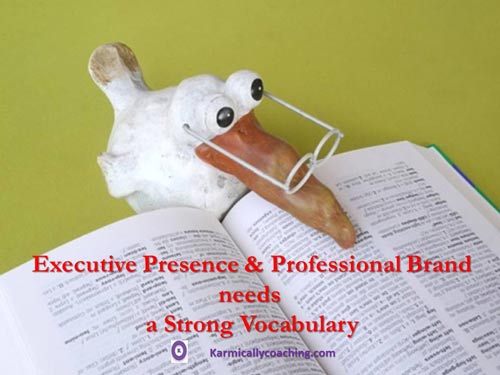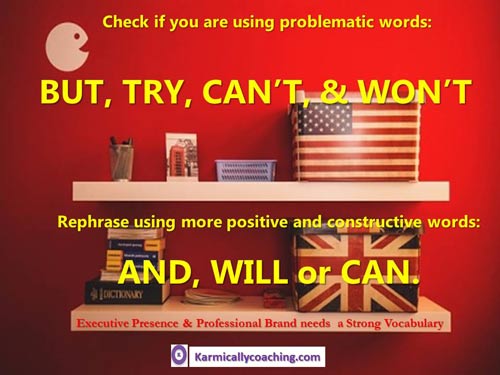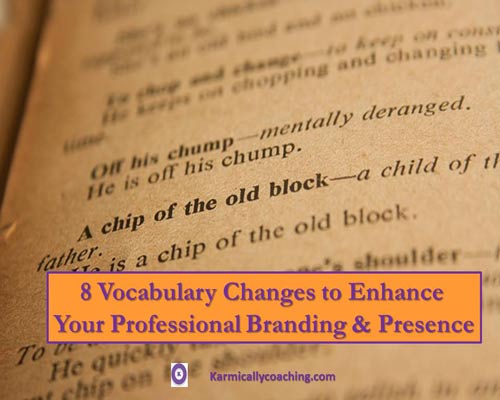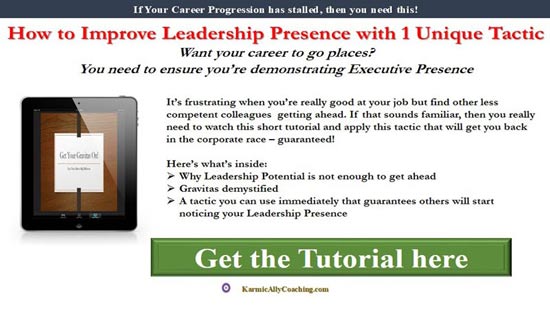This post has already been read 4198 times!

A career coaching client of mine recently asked a valuable & pertinent question relating to word usage and executive presence.
Does the usage of words affect management’s perception of an employee and their capabilities?
The simple affirmative answer is Yes – to some extent.
You may be the most focused, motivated and goal-oriented employee in the workplace. You consistently deliver the goods and yet you get counselled to be more positive and confident during yearly appraisals. It baffles you and you feel misunderstood and demoralized.
Studies indicate that in a communication where both people are totally congruent at the time of communicating, some 55 per cent of their communication will be by body language, approximately 38 per cent will be based on tonality of voice and only 7 per cent will derive from the words themselves.
But what if the congruence is missing?
The words used would then definitely take on more importance.
Your choice of words can influence your work environment, your superiors and your colleagues both positively and negatively.
A simple example would be if your boss asks you to do something which may or may not be challenging. Your body language and tone of voice while accepting the task indicate excitement but you see the manager look apprehensive.
Have you checked the words you used?
Words communicate more than you think about your Executive Presence
Our communication skills reflect our professional brand and more importantly impact our Executive Presence.
In Want to be Successful? First Build Your Positive Reflex, I quoted the Center for Talent Innovation’s survey results that showed that 28% of the survey respondents felt communication was a critical criterion for bosses and co-workers when evaluating Executive Presence.
I’ll share a true story to validate the survey result from my corporate world years.

. .
I once had an efficient team member who always got the job done but did not get the desired career results. The general opinion among his managers was that he lacked confidence.
In the early days of working together, I reacted towards him with the same apprehension as other managers until I realized that his usage of language was the problem.
Unwittingly, this otherwise competent person was sending out the message of doubt, low self-esteem and lack of self-confidence.
Not good when you are working in a high-pressure environment and your manager has enough on his/her plate and not enough time to do in-depth analysis of the team member’s language skills.
I mean, how do you tell someone that “hey, you are good at your job, but stop saying words, ‘but’ won’t and ‘can’t’ as if they’re going out of fashion”? Or is sending out the wrong message and is not going to take your career places?
By the time appraisal time rolls by, the matter is often not on the agenda.
Having made my discovery, I decided to do something about it. My task in mentoring him started to revolve around the usage of words which were sending out the wrong negative message and showing him in a weak, defiant and diffident light.
Typical statements that needed correction included:
I’ll try my best
I won’t promise anything, but I’ll see what I can do.
Sure, but (followed by his questions to clarify the task which sounded more like defiance and a hint of resistance)
A few months of gently correcting him whenever he used the words But, Try, Can’t and Won’t by repeating back his sentences with more pleasing words like And, Will and Can made a world of difference, particularly while working with other managers.
The last I heard of him; he was in demand with promotions taking him where he should have been going in the first place. He was gearing up for a leadership role.
While body language and tone of voice will always be important, do check if you are using problematic words like “BUT, TRY, CAN’T, & WON’T“.
If you catch yourself doing it, take a step back, breathe deep and rephrase using more positive and constructive words such as: AND, WILL or CAN.
While on the subject of words, please drop using ‘Just’ because it’s disempowering.
In an interesting LinkedIn post that I read a few years ago that was also published in Business Insider (India Edition), writer Ellen Petry Leanse pointed out that “Just” was a “permission” word, in a way — a warm-up to a request, an apology for interrupting, a shy knock on a door before asking “Can I get something I need from you?”
In her analysis, it is a “child” word, in the context of Transactional Analysis. It puts the “parent” position, granting them more authority and control.
It is a subtle message of subordination and self-effacing. She noted that striking it from a phrase almost always clarified and strengthened the message.
How many times do you use “Just” in your communications? Strike it out!
8 Vocabulary changes to enhance your professional branding & presence
My young colleague’s career benefited; by changing some words that presented him as a confident, articulate and diplomatic professional.
That is just the tip of the iceberg.

Your vocabulary plays an important part in how you articulate yourself and communicate with greater accuracy and clarity.
Here are a few suggestions:
- Develop a strong vocabulary by reading more books and adding to your knowledge of words as suggested in London School of Public Relations Article: Vocabulary & Executive Success by John Dalton
- Purchase a good dictionary or thesaurus or bookmark a good online definitions website and check out words that you can use. The more words you know, the broader your vocabulary and your ability to use the appropriate word in the right context for effective communication. (Embed your new learning by doing crosswords)
- Remove certain words and phrases from your vocabulary if you don’t want to ruin your executive presence. Wipe out all those qualifiers, fillers and jargon that send out the wrong message.
Some typical words that I recommend starting with are placeholder words like ‘Um’ that make you sound indecisive.
On an aside, I had a boss who used to Um a lot during her training presentations. While her content was good, the juniors spent their time marking how many Ums were used during the presentation – not good.
- Stop using social media jargon in your professional communications. Replace buzz words in your resume and social media profiles because it shows you really don’t know what you are trying to say and have jumped on the bandwagon instead of being unique.
- Refrain from using Honey, Darling, Sweetheart while talking or writing to colleagues. Keep those for the people in your life who deserve to be addressed with terms of endearment. I still remember the time a new connection wrote darling to me on LinkedIn. I disconnected immediately without thinking twice about a win-win business opportunity.
- Informal parlance phrases and words – ‘you know what I mean’ and ‘like’ or even etcetera. Do the heavy lifting in your communications. Don’t leave the other person wondering if YOU know what you are talking about.
- Sometimes our words send out a subtle message of our own anxiety or nervousness. If this is you, then practice using a Cue Word.
- Revisit your vocabulary. See which words or phrases need to be reframed to present you in the most confident and positive light possible.
Your turn.
Do your words empower or disempower you? Do they add or subtract from your professional brand and executive presence?
Want to improve your Leadership Presence quickly? Then you want to check out this short tutorial with exercises that help you use your voice to demonstrate Executive Presence here. Click on the preceding link or image below to access the tutorial.




 I adhere to the Certified Coaches Alliance Code of Ethics and Standards. A copy is available on request.
I adhere to the Certified Coaches Alliance Code of Ethics and Standards. A copy is available on request.
 Email:
Email:
I love the message in the post. The power of word have bee well explained.However, I wonder why most accounting professionals rarely take it serious!. Wonderful tips.
Thanks Steven. Accounting professionals are a different brand of people, lost in their numbers, processes and systems. 🙂 I doubt they take it lightly but when one is focused on 1 area, we often use words and phrase that are detached from the human perspective. A good point. Thanks!
Words are indeed powerful. I agree – take the words like can’t and try out of your vocabulary and replace with empowering words like will and can with confidence. It can change your life. Great tips!
Thanks Julie. Simply removing those words from our vocabulary and using more empowering ones can make a big difference to our presence and self-confidence.
Nice one Vatsala. There was a time, when the “total package” of professionalism included how and what you say. These days, despite the ACCA and other professional bodies reserving between 4 to 6 marks for professional presentation, I find as an examiner that there is frequent use of SMS lingo. I do “get it” that being millenial means that one feels entitled to informalism as the main religion. However, given that promoters and heads of businesses STILL have baby boomers too requires a careful adoption of the good practices you highlight above.
Thanks Sanjay. I’ve seen the SMS lingo being used during messaging by millennials and while I too get it, it doesn’t bode well for their careers if that is the same lingo they’re using at work. I agree with you that businesses need to find the sweet spot for baby boomers as well as the younger generation.
I love this message! I also agree with Natasha about how language (and delivery) varies depending upon the audience and I learned about this the hard way. After years in the hotel industry, I took an upper management position with a major visitor attraction. I was used to wearing suits, carrying my trusty briefcase and chatting with CEO’s, but in my new environment, I worked with biologists, naturalists, environmentalists and Hawaiian cultural advisors.
About a month into the job the other managers organized an intervention and asked me to “lighten up!” I was still wearing suits and talking like I was negotiating a contract (which made some feel like I was talking down to them), while everyone around me was in shorts and getting in touch (literally) with the animals we cared for and I needed to do a better job of fitting in. They weren’t mean about it, in fact, we all had a good laugh. But that was an important lesson for me that I’ll surely never forget.
Dressing according to the work culture is important, Marquita. Your experience reminded me of the time I was working in Copenhagen where the dress code is informal and had a shock the day I saw my colleagues dressed like Britishers. 🙂 It turned out they were going to meet a new client who was British and were dressing for the part. Adapting to the need of the hour is important, as you and Natasha have pointed out. Thanks for enriching the conversation!
Such great points Karmic! Words have extreme power as does how we use them.
Thanks April!
Brilliant analysis. Very clear and helpful, thank you Vatsala.
My pleasure Julia. Delighted you found the analysis useful.
Very true. Language varies depending on various fields. I do not speak to students with the same verbiage of clients. Xoxo
Getting our message across to the right audience requires using words that they would comprehend, Natasha. 🙂
I know that I do some of these things. I am going to make a concious effort to watch those habits and be more positive. Thank you for sharing.
You’re in good company, Sabra. Many of us do some or all of these things without realizing that we are doing it until it’s brought to our attention. The key to success is to shift from a conscious effort to a natural one.
I love this post and I love being aware of the power of casual usage to create an effect – for good or for ill. You did that young man an enormous favor by helping to retrain him on his word habits! Women in particular often need help in learning how to communicate more assertively and positively.
Thanks Reba. The then young man had a lot of potential and the only thing that was blocking him was how he projected himself and the words he used. I agree that women often need help to being more assertive without appearing bossy – the other end of the spectrum in a still male oriented workplace.
Oh, this so tweaks me, Vatsala. I’ve put in the forefront of my mind to be more cognizant of the words I use, as I so believe how we communicate matters. Great blog!
Thanks Susan. Hindsight has 20:20 vision and years after I left school, I finally understand why our English Literature Teacher used to insist we borrow books from the library, especially classics and read them. 🙂